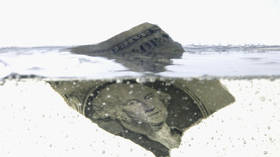Dow plunges to nearly two-year low

The Dow Jones Industrial Average plummeted to its lowest point in nearly two years on Friday, falling 2.5% to 29,335 in afternoon trading, with every component stock seeing a decline.
The index has lost over 13.7% of its value since the Federal Reserve began raising interest rates in March in an effort to rein in runaway inflation.
The S&P 500 also took a nosedive, dropping to its lowest point of the year at 3,667, a decline of more than 15% since March. The Nasdaq fell to 10,847, down 20% since March.
The market-wide drop came days after the Fed’s latest 75 basis-point interest rate hike, which brought the current federal funds rate to between 3.00% and 3.25%. The central bank is struggling to tamp down the highest inflation numbers seen in four decades.
Although annual inflation fell to 8.3% in August, down slightly from July, the monthly headline figure was up 0.1% over July, a higher reading than expected. That triggered another sharp selloff in markets earlier this month, sending stocks on September 13 to their worst day of trading since June 2020.
The Fed plans to increase rates still further before the end of the year and projects a rise to 4.60% in 2023 before any potential cuts, even as many economists fear further hikes will tip the economy into a full-on recession. Indeed, Fed Chair Jerome Powell has acknowledged that the central bank’s efforts have contributed to “declining activity of all kinds” in the housing market and could cause unemployment to climb.
The majority of economists forecast the US entering a recession by mid-2023, according to a survey conducted by the National Association of Business Economics last month, while 20% believe that it is already there.
President Joe Biden, however, insisted earlier in the month that things are “going to be fine,” reminding the population that “the stock market doesn’t necessarily reflect the state of the economy, as you well know.”
“The economy is still strong,” he claimed. “Unemployment is low. Jobs are up. Manufacturing is good. I think we’re going to be fine.”














